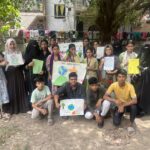Foundation for Equal Citizenship (FFEC) has been at the forefront of empowering women through education and awareness. In a series of four Ramadan special classes, FFEC aimed to equip women with the knowledge and tools to maintain a proper diet during Ramadan and make fasting easier. These sessions delved into crucial aspects such as diet management, hydration, sugar intake, and recommended foods during Ramadan.
The first session focused on understanding the importance of a proper diet during Ramadan. Fasting can disrupt regular eating patterns, leading to nutritional imbalances. FFEC emphasized the significance of consuming a balanced diet comprising all essential nutrients to ensure good health and energy levels throughout the fasting period. Women were educated on incorporating foods rich in proteins, healthy fats, vitamins, and minerals to support their overall well-being.
Hydration is paramount, especially during long hours of fasting. In the second session, participants learned about the importance of staying hydrated and strategies to maintain optimal water intake. FFEC provided practical tips on consuming water-rich foods, scheduling water consumption between iftar and suhoor, and avoiding excessive caffeine and sugary beverages that can lead to dehydration.
Sugar intake was another crucial topic discussed in the third session. Excessive sugar consumption can cause energy spikes and crashes, leading to fatigue and mood swings during fasting. FFEC educated women on identifying hidden sugars in processed foods and encouraged them to opt for natural sweeteners like dates, fruits, and honey, promoting sustained energy levels and better overall health.
The final session delved into specific foods recommended during Ramadan and those to avoid. FFEC highlighted the importance of incorporating complex carbohydrates for sustained energy release, lean proteins for muscle repair and satiety, healthy fats for hormonal balance, and fiber-rich foods for digestive health. Participants were also educated on limiting fried and sugary foods that can lead to bloating, fatigue, and weight gain.
Through these in-depth sessions, FFEC empowered women with practical knowledge and strategies to navigate Ramadan fasting effectively. Participants gained a deeper understanding of nutrition’s role in maintaining physical and mental well-being during fasting. Moreover, they were equipped with valuable insights on making informed food choices, promoting long-term health benefits beyond the Ramadan period.
The impact of these classes extended beyond individual participants, influencing families and communities to adopt healthier eating habits during Ramadan and beyond. By focusing on education and empowerment, FFEC continues to foster a culture of wellness and equality, ensuring that all individuals, regardless of gender, have the resources and support to lead healthy and fulfilling lives.
In conclusion, Foundation for Equal Citizenship’s Ramadan special classes exemplify their commitment to empowering women through education and awareness. These sessions not only provided practical guidance on maintaining a proper diet and making fasting easier but also fostered a sense of community and empowerment among participants. FFEC’s efforts contribute significantly to promoting health, equality, and well-being in society.

